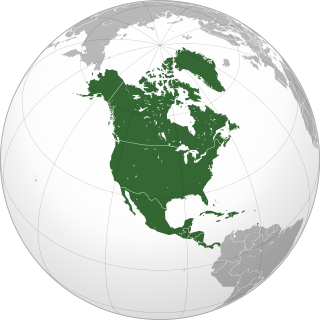An enclave economy is defined as an economic system in which an export based industry dominated by international or non-local capital extracts resources or products from another country. It was widely employed as a term to describe post-colonial dependency relations in the developing world, especially in Latin America. [1] As part of the larger theoretical position usually called dependency theory. It was particularly popular in the 1960s and 1970s, and other issues took center stage in development economics at later periods. It was often associated with Marxism, thanks to writing by Paul Baran [2] and Theotonio Dos Santos, [3] though its tenets are only peripherally tied to classic Marxist theory.

Latin America is a group of countries and dependencies in the Western Hemisphere where Romance languages such as Spanish, Portuguese, and French are predominantly spoken; it is broader than the terms Ibero-America or Hispanic America. The term "Latin America" was first used in an 1856 conference with the title "Initiative of the America. Idea for a Federal Congress of the Republics", by the Chilean politician Francisco Bilbao. The term was used also by Napoleon III's French government in the 1860s as Amérique latine to consider French-speaking territories in the Americas, along with the larger group of countries where Spanish and Portuguese languages prevailed, including the Spanish-speaking portions of the United States Today, areas of Canada and the United States where Spanish, Portuguese and French are predominant are typically not included in definitions of Latin America.
Dependency theory is the notion that resources flow from a "periphery" of poor and underdeveloped states to a "core" of wealthy states, enriching the latter at the expense of the former. It is a central contention of dependency theory that poor states are impoverished and rich ones enriched by the way poor states are integrated into the "world system".

Marxism is a theory and method of working class self-emancipation. As a theory, it relies on a method of socioeconomic analysis that views class relations and social conflict using a materialist interpretation of historical development and takes a dialectical view of social transformation. It originates from the works of 19th-century German philosophers Karl Marx and Friedrich Engels.
According to the model, a large, well capitalized firm, often located in North America or Western Europe invests in the production of an export product destined for markets in the investing country or region. Frequently the country in question had been a colonial master, even if the political chain was broken a considerable time before. [4] It uses its capital and often political connections, both formal and informal, legal and illegal, to acquire land, access labor, and received incentives such as tax breaks. These incentives in turn reduce the capacity of the host country to realize any financial or developmental benefits from the exports.

North America is a continent entirely within the Northern Hemisphere and almost all within the Western Hemisphere; it is also considered by some to be a northern subcontinent of the Americas. It is bordered to the north by the Arctic Ocean, to the east by the Atlantic Ocean, to the west and south by the Pacific Ocean, and to the southeast by South America and the Caribbean Sea.

Western Europe is the region comprising the western part of Europe. Though the term Western Europe is commonly used, there is no commonly agreed-upon definition of the countries that it encompasses.
In some cases, the firms operating in enclave economies are able to influence governments in host countries to allow exploitative labor practices, to suppress resistance or the formation of labor unions and thus exploit workers. Its relationship with the host government is also held to promote corruption, both at the local level and in the attitudes of the host country towards the international interests of the firm.
Scholars have debated the terms of the theory of enclave economies, some arguing that the effect of tax breaks is temporary, others pointing out that workers are sometimes better paid than their fellow workers. Others point to potential linkages between the workers, host country and the projects of the investing firm (for example in constructing infrastructure) have a more beneficial effect that the original theorists suppose. [5]







